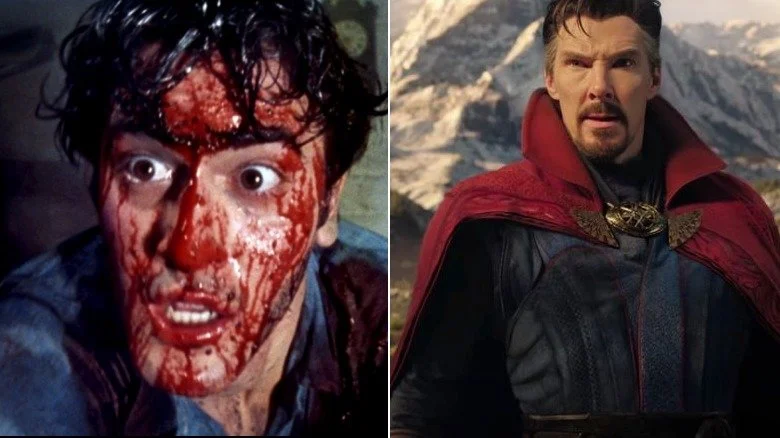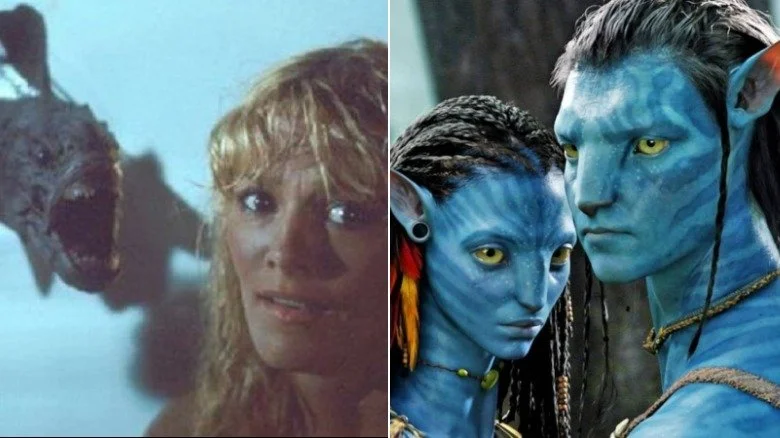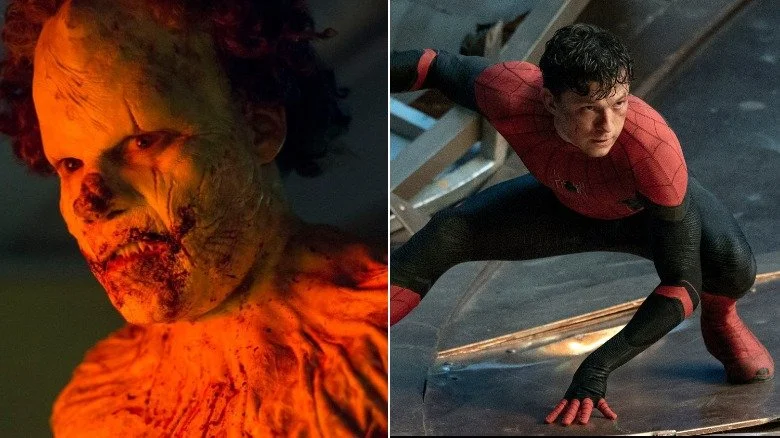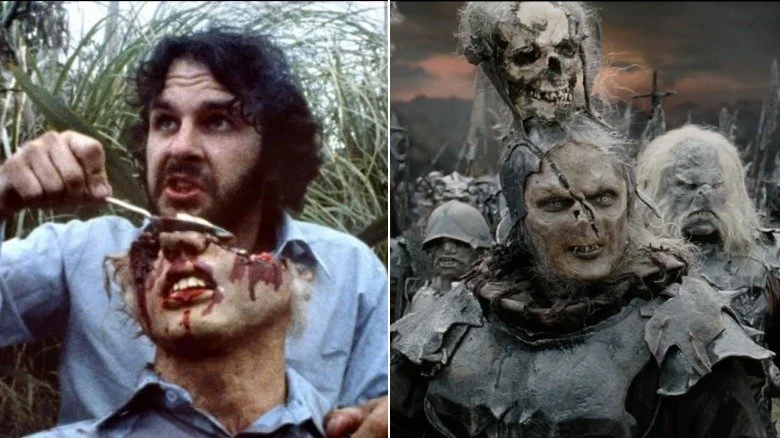Revenge of the Film Freaks
There’s a lot to be said about “blockbuster” or “franchise” films nowadays. Depending on where you fall in the film discourse, these attention-grabbing flicks can be either wholly negative or joyfully positive. Each side makes its fair share of good and bad points but it’s hard to deny, on a surface level, the feeling that a blockbuster film can more easily consume the personality of a distinct filmmaker compared to that of a film with a humbler budget and crew. Of course, that’s a simple take on a matter with a little more depth; most blockbuster filmmakers we know today had to start somewhere, and, coincidentally enough, a lot of these billion-dollar franchise wranglers got their start in the horror scene. And not just any type of horror. We’re talking about some down-and-dirty flicks that one would watch while peeking over the shoulders of their parents so that Mom and Dad won’t catch ‘em.
With October now in full swing, Hyperreal Film Club has decided to do the always 100% right move and screen Peter Jackson’s Dead Alive (or Brain Dead, if one prefers) for any lucky patrons willing to catch it for the first or hundredth time. Far from the beauty and vast wonder of Middle-Earth that Jackson is now known for, Dead Alive is a gleefully tongue-through-cheek, go-for-broke viscera-fest that proves that inside every big budget filmmaker lies the film freak that laid the path for their future riches and acclaim. Below, we’ll see that there are other big budget filmmakers like Jackson who cut their teeth (and other body parts) in the gory corners of DIY horror movie making.
Sam Raimi
Money Maker: Doctor Strange in the Multiverse of Madness; Worldwide Gross: $955,775,804
Freaked Film
The Evil Dead [1981]; Worldwide Gross: $2,661,944
Potentially one of the more well-known film freaks still running around big budget movies in Hollywood, ol’ Sam Raimi found his humble beginnings in the simple idea of a group of friends visiting a cabin up and finding the literal fangs of Hell descend upon them. Before getting his hands on the original Spider-Man trilogy with Tobey Maguire in the early 2000s, Raimi delivered to the world in 1981 one of the most violent assaults on the senses the screen had seen up to that point. The Evil Dead (itself a franchise that, to this day, still has strong legs) operates around the simple set up of things going bump in the night at a cabin in the woods but what really sets it apart is how much carnage fills the film’s pedestrian set up. From pencils stabbed into heels, to decapitations by shovel and melting faces, The Evil Dead isn’t shy to utilize everything it can to shock and disturb the audience. To their credit, Raimi and his film crew of friends, including Bruce Campbell as the film’s strong-chinned hero, do indeed pull off the feat of creating an unrelenting horror experience on a shoe-string budget. It’s not all perfect; the acting across the board is plain at worst and overdramatic at best, and in the context of modern times a few of the effects show the strains of time. But even with those flaws, there’s an unmistakable skill and joy that permeates through the screen as we see a future master of the craft baby step his way into a cult classic horror film.
One of the best things about Raimi is that even after experiencing the success of gritty, gallons-of-blood horror filmmaking, he struck out into other genres ranging from westerns (The Quick and the Dead) to sports dramas (The Love of the Game) and, of course, superhero flicks, most famously in his nearly perfect Spider-Man trilogy (or Darkman, if you’d rather). But even as he’s dabbled in other genres, that giddy young man excited to show you his next gory gross-out effect still remained in the mainstream superhero flicks he’d helm. For Raimi, everything could dip into horror, and for that, each of his movie’s carry an unmistakable stamp of auteurship.
James Cameron
(Money Maker: Avatar; Gross Worldwide: $2,743,577,587
Freaked Film
Piranha 2: The Spawning. Gross: $389,106
Now this one might be bending the rules a bit since Cameron’s involvement in the making of Piranha 2 seems to be short lived as, allegedly, the burgeoning filmmaker was fired just a few weeks into the making of this much-maligned sequel. Even so, the man’s name is still on the tin of the thing and in a way, without it, who’s to say whether James Cameron ever comes up with the idea of his future hit The Terminator? Cameron himself once admitted that while attending the release for Piranha 2 in Italy, he found himself so exhausted and feverish that he had a dream of a cyborg crawling out of flames, its skin melted off. That horrifying dream eventually led to the creation of Arnold Schwarzenegger’s star-making role.
Even outside of its unintended influence on Cameron’s later filmography, there’s still bits and pieces of the filmmaker everyone knows to be found in the cheesy undertow of Piranha 2. For one thing, the film is centered around the dangers and mystery of the sea—depths that Cameron would continue to explore in a variety of films further in his career. One might also find the character of Anne Kimbrough, a swimming instructor played by Tricia O’Neill (who would later appear in Cameron’s Titanic), as a sort of first go-round for the director in offering audiences a relatively independent and reliable female protagonist in a horror film. Sure, she’s no Ripley or Sarah Conner, but let it be known that Anne Kimbrough, fearless diving instructor, faced off against rubber piranhas and lived to tell the tale! Additionally, Lance Henriksen—who would later appear in The Terminator and Aliens—also pops up here sporting a glorious tan in his first pairing with Cameron as O’Neil’s ex-husband sheriff. While it’s far from a great film, Piranha 2 still has a few charms to offer, mainly that of little puppet piranhas flying around the screen, diving at people’s necks like the rabbit from Monty Python and the Holy Grail. You also get a pretty sick intro scene with a bumping score by Stelvio Cipriani to really set the mood for a goofy monster flick.
Jon Watts
(Money Maker: Spider-Man: No Way Home; Worldwide Gross: $1,906,693,477)
Freaked Film
Clown (2016) (Gross: $4,381,603)
While he’s not as recognizable a name as the other directors on this list, director Jon Watts shares a similar path as those other successful tentpole directors. Shot in 2012 but not released until 2016, Clown acted as Watts’ first shot at directing a legitimate film. Backed by Eli Roth as a producer, Watts’ Clown adapted his own one-minute short film and continues the intriguing horror premise of a father who finds himself slowly becoming a child-eating clown after he puts on an old, dusty suit he found in a random basement (as one does).
The film itself is a solid enough exercise in clown horror and if anything, the film showcases Watts’ dependable, if unassuming, talent behind the camera; a skill that can be noticed in his relatively enjoyable Spider-Man films. The one interesting through line found in Clown that pops up in Marvel’s web-slinging franchise and even Watts’ 2017 Cop Car is the way his films center around kids facing off against bigger odds than themselves. While Clown’s main protagonist is Andy Powers’ hapless father character, the entirety of the film rests on the tension of if, or when, Powers’ character will give in to his cravings for child flesh. To his credit, Watts doesn’t shy away from throwing the kids in this film into mortal danger, a characteristic found in the duo of boys facing off against a dirty cop in Cop Car and of course, teenage Peter Parker facing off against the likes of a psychotic Jake Gyllenhaal, Michael Keaton, and Willem Dafoe, among others, in the three Spider-Man entries Watts has helmed.
Peter Jackson
(Money Maker: The Lord of the Rings: The Return of the King; Worldwide Gross: $1,140,682,011
Freaked Film
Bad Taste (1987), Gross: $150,000 - $200,000
With just a dream, about a $25,000 budget, and a willing group of friends, Peter Jackson’s first film is a cheap blast of wacky alien carnage. In this film, a group of space invaders have taken over the quiet New Zealand town of Kalihoro and it’s up to the elite task force known as AIDS (Alien Detection and Investigation Service) to stop these human-craving aliens from making humanity its next meal. A far cry in both budget and attitude from Jackson’s future exploits in relatively self-serious big budget filmmaking, Bad Taste thrives in the joys of its title, throwing gore, childish insults, and Three Stooges-level physical comedy at its audience for about 100 minutes. Nevertheless, one can see the benefits of Jackson’s skill for never-ending commitment that later powered him through filming the entire Lord of the Rings trilogy nearly back to back to back. Bad Taste itself was filmed over the course of four years (mainly on weekends) and Jackson and his crew designed and created all the practical effects themselves in addition to acting in the film in multiple roles. Even if some of the more invigorating images come across as cheap cheese, there’s still a palatable charm to be found in the physicality of all the ridiculous gore Jackson throws out—a skill that would later be super-sized in his wildly entertaining Dead Alive and later appear in the Orc designs in the Lord of the Rings trilogy. It’s not the prettiest debut, but it was never intended to be. Instead, Jackson’s first film shows the inklings of imagination and dedication that would later expand grandly across the mountains, valleys, and kingdoms of Middle Earth.
These directors – and many others unaccounted for here – each found a jumping off point in the throes of cheap horror films. While not every debut would be a winner (or even well-remembered), it’s hard to deny the unspoken power the horror genre can hold for any filmmaker. Whether the horrors stay on screen or off, horror forces a filmmaker to get a little more creative with their (usually smaller) budgets. Indeed, if one can make magic out of fifty cents, imagine what one could do if given a million dollars. While it’s easy to dismiss a lot of big budget filmmaking as soulless, take a second to step back and wonder if that billion dollar director doesn’t have a few weird films under their belt already. As these filmmakers prove, the sky’s the limit for film freaks.





Hailing from Dallas, Texas, Justin Norris lives and breathes for one thing: movies. When not constantly telling people he’s “working” on a script, film review, or novel, he’s actually really trying to work on those things, guys, just trust him! Anyway, he’s also into casual reading, being an intense New York Jets fan, playing pickup basketball, and of course, catching a flick at the local theater.
To get more personal, follow the jabroni at:
Twitter: @DaRealZamboni
Instagram: justinnorris12
Letterboxd: DaRealZamboni
Medium: https://medium.com/@justinnorris12